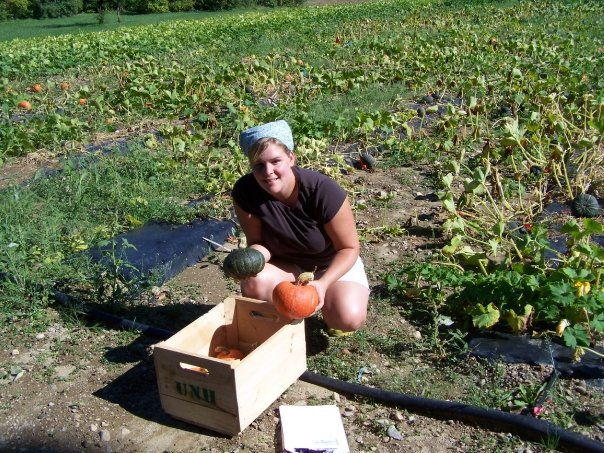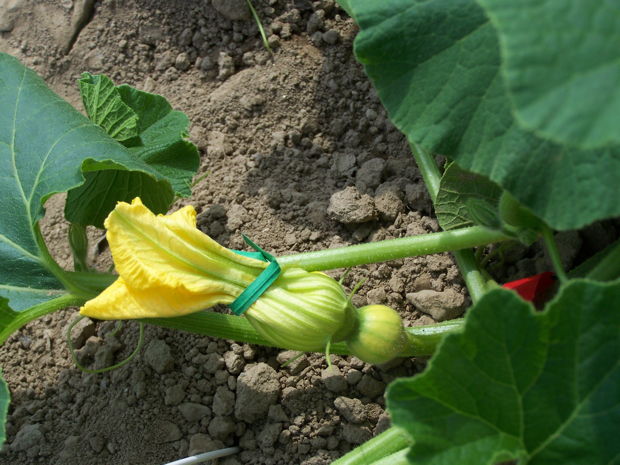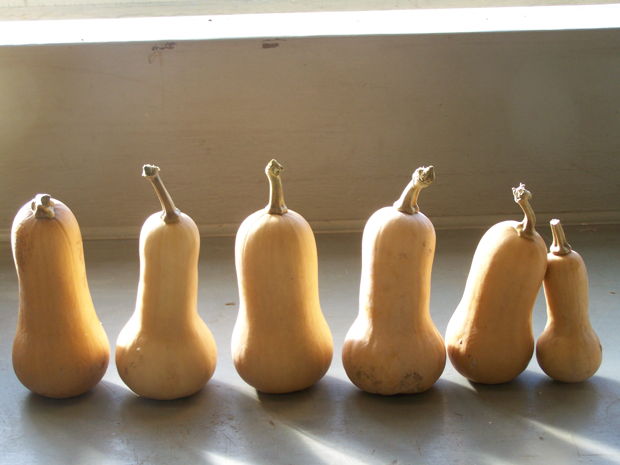Crouched down in the middle of a winter squash field, I am greeted by the hum of pollen-laden bees and the chirping of crickets. It is a hazy summer morning, air hanging as if suspended. Most of my fellow graduate students are still in bed, yet I am out in the field starting my day among the dew-soaked plants.
Snow is starting to fly here in New Hampshire, but memories of my summer research remain fresh. As a Ph.D. candidate I look forward each year to leaving the hustle and bustle of academic life —- with its ever-looming deadlines and overflowing inbox —- to find quiet solace in the fields of the research farm. During the school year it can be a struggle to make time for my relationship with God when all of these work priorities are vying for my time and attention, but my perspective clears when I am in the field.

As a scientist, I feel fortunate to find evidence of God’s handiwork and God’s presence throughout my research. How can I ignore it when I sow seeds in the freshly plowed earth and watch thick green stems and leaves pop up out of the ground? Or when I open each squash to find deep orange fruit flesh not only beautiful but life-giving and nutritious? When I harvest seeds from these fruits and begin to plant for the following season, I see vividly how God thought of everything. Even packaging.
During the summer, I conduct field research on winter squash which involves some breeding work. There is a short window of time each day when pollination is possible. Each morning, as I search among the mass of vines and leaves looking for the next flower to pollinate, I feel like a bee. As a breeder, I choose a male and female flower on each plant that is just about to bloom, the flower petals turning from green to yellow at the tips. I close both flowers up with a twist tie, and leave to let nature take its course. When I return 24 hours later, the flowers’ petals have turned a pale yellow and puff out beneath the twist tie like a satchel. I gently pluck the male flower from its long petiole and pull the petals back to reveal a fused stamen laden with powdery yellow pollen. The female flower is untied and I gently sprinkle the male’s pollen onto the female’s stigma. Even at that this point the female flower bears resemblance to its final form, its tiny ovary shaped like a dumbbell, developing into a butternut squash at maturity.

God’s hand is in all of this work, even causing the pollen to shed early in the morning which ensures the best chance for pollination -— the pollen is only viable between 6 a.m. and 10 a.m., when temperatures are below 70 degrees. Without pollination during this short window of time, fruit would not form and the flowers would wilt under the rays of the hot summer sun. I marvel every time as I follow a flower bud from its early formation to the fully matured squash.
The process of pollinating by hand is time consuming, tedious, and strenuous. It is a task that requires patience and persistence. I look forward to this time in the field every summer, but not without some trepidation. I know it is going to be hard work, but when I am there, I am filled with awe as I see God’s hand in the natural beauty of the land. I smell the earth, a mix of decomposing plant matter and worm castings. I hear birds calling and see dragonflies whizzing around overhead. As someone with faith, it is simultaneously a source of awe and a reminder of God’s power and plan.
As an educator in the natural sciences, one of my greatest joys is sharing my passion for creation with the students that attend my lectures or labs. In the secular university setting, I may not be able to attribute all of these amazing creations to the Maker but I can at least draw awareness to them, often with great enthusiasm, while digging through the soil strata or observing tiny root hairs on sweet potatoes. I even find myself doing this with friends, on walks through the woods or at the dinner table. Some are believers and others not, but the message of the wonder and beauty of the natural world is universal.

We are not all meant to be field research scientists. The work can be repetitive and tedious. But for me it also provides time to take in the beauty of God’s creation and to see clearly his hand at work. With a reverence for God’s creation, my work has an extra dimension that is calming and worshipful. Observing God’s creation and giving him the glory gives meaning to the mundane tasks needed to produce this body of work. I pray it may be used in his service.